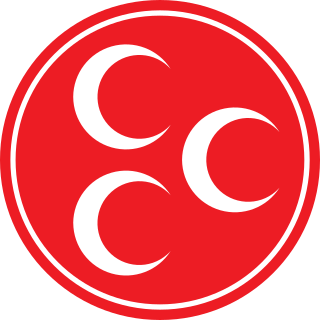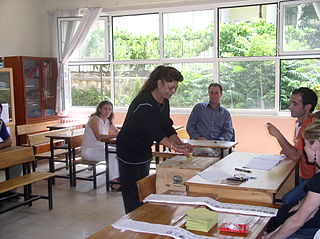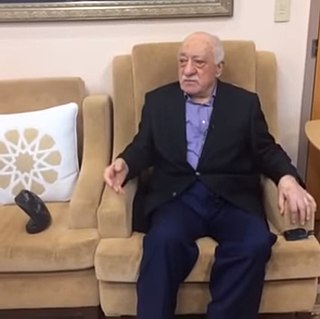
The Justice and Development Party, abbreviated officially AK Party in English, is a political party in Turkey self-describing as conservative-democrat. It is one of the two major parties of contemporary Turkey along with the Republican People's Party (CHP).

Adnan Oktar, also known as Adnan Hoca or Harun Yahya, is a Turkish religious sex cult leader, creationist/anti-evolutionist, conspiracy theorist, preacher, pamphleteer, and "worldwide celebrity". In the 2000s, he was engaged in "a massive campaign" of proselytizing" Westerners to Islam, producing dozens of cheap, short, vividly illustrated books in the languages of Europe and the Muslim world. As of March 2022, he is awaiting retrial on several sex and financial charges.

The Nationalist Movement Party is a Turkish far-right, ultranationalist and Eurosceptic political party. The group is often described as neo-fascist, and has been linked to some violent paramilitaries and organized crime groups. The party is represented by 48 MPs in the Turkish Parliament which support the AKP government. Its leader is Devlet Bahçeli.

The National Salvation Party was an Islamist political party in Turkey, founded on 11 October 1972 as the successor of the banned National Order Party. The party was formed by a core group of working cadres of the now banned MNP, with Süleyman Arif Emre serving as the registered founding chairman. Given the banning of the MNP by the staunchly secular state, only 19 individuals were ready to form the party. Necmettin Erbakan, who took part in the formation of the party, officially joined the party in May 1973, taking over the reigns of the party in October 1973. The party grew more popular and in 1973 elections it gained 11.8% of votes, gaining 48 seats in the Turkish Grand National Assembly. In 1977 elections it gained 8.56% of votes and won 24 seats. In 1974 it formed the coalition government with the secularist Republican People's Party (CHP) of Bülent Ecevit. MSP was closed down after the 1980 military coup.

General elections were held in Turkey on 22 July 2007 to elect 550 members to the Grand National Assembly. Originally scheduled for November, the elections were brought forward after parliament failed to elect a new president to replace Ahmet Necdet Sezer. The result was a resounding victory for the incumbent Justice and Development Party (AKP), which won 46.6% of the vote and 341 seats. The party's leader Recep Tayyip Erdoğan was consequently re-elected as Prime Minister of Turkey. The opposition Republican People's Party (CHP) came second with 20.9% of the vote and took 112 seats. The Nationalist Movement Party (MHP), which had failed to surpass the 10% election threshold in the 2002 election, re-entered parliament with 14.3% of the vote and 71 MPs. The election was fought mostly on Turkey's debate over laïcité that had been perceived to be under threat from the AKP's nomination of Foreign Minister Abdullah Gül, an Islamist politician, for the Presidency. Developments in Iraq, secular and religious concerns, the intervention of the military in political issues, European Union membership negotiations, the United States and the Muslim world were other main issues.

Muhammed Fethullah Gülen is a Turkish Islamic scholar, preacher, and a one-time opinion leader, as de facto leader of the Gülen movement. Gülen is designated an influential neo-Ottomanist, Anatolian panethnicist, Islamic poet, writer, social critic, and activist–dissident developing a Nursian theological perspective that embraces democratic modernity, as a citizen of Turkey he was a local state imam from 1959 to 1981. Over the years, Gülen became a centrist political figure in Turkey prior to his being there as a fugitive. Since 1999, Gülen has lived in self-exile in the United States near Saylorsburg, Pennsylvania.

Secularism in Turkey defines the relationship between religion and state in the country of Turkey. Secularism or Laicism was first introduced with the 1928 amendment of the Constitution of 1924, which removed the provision declaring that the "Religion of the State is Islam", and with the later reforms of Turkey's first president Mustafa Kemal Atatürk, which set the administrative and political requirements to create a modern, democratic, secular state, aligned with Kemalism. Such reforms have been historically controversial in a society that is mainly Sunni Hanafi.

Islam is the largest religion in Turkey according to the state, with 99.8% of the population being initially registered by the state as Muslim, for anyone whose parents are not of any other officially recognised religion and the remaining 0.2% are Christians or adherents of other officially recognised religions like Judaism. Due to the nature of this method, the official number of Muslims include people with no religion; converted people and anyone who is of a different religion from their Muslim parents, but has not applied for a change of their individual records. These records can be changed or even blanked out on the request of the citizen, by filing an e-Government application since May 2020, using a valid electronic signature to sign the electronic application. Any change in religion records additionally results in a new ID card being issued. Any change in religion record also leaves a permanent trail in the census record, however, record of change of religion is not accessible except for the citizen in question, next-of-kin of the citizen in question, the citizenship administration and courts.
The Gülen movement, referred to by its participants as Hizmet ("service") or Cemaat ("community") and since 2016 by the Government of Turkey as FETÖ, is an Islamist fraternal movement led by Fethullah Gülen, a Muslim preacher who has lived in the United States since 1999. The movement is designated as a terrorist organization by Turkey, Pakistan, and the Gulf Cooperation Council. Owing to the outlawed status of the Gülen movement in Turkey, some observers refer to the movement's volunteers who are Turkish Muslims as effectively a sub-sect of Sunni Islam; these volunteers generally hold their religious tenets as generically Turkish Sunni Islam.

The Party for Change in Turkey, or TDP, is a Turkish political movement originally started and founded in 2009, transforming into a political party in 2020 under the leadership of Mustafa Sarıgül. It was formerly in the process of organizing as a political party way-before 2020.
Abdülkadir Aksu is a Turkish politician from Diyarbakır. According to some sources, he is Kurdish; according to Üzeyir Tekin, he is of partial Albanian and Kurdish origin; and according to Hasan Celal Güzel, a friend of Aksu family, he is of Turkish (Turkmen) origin.
The “Turkish model” refers to the focus on Republic of Turkey as "an example of a modern, moderate Muslim state that works." Turkey has been seen as combining a secular state and constitution, with a government run by a political party or political parties with "roots in political Islam". The AKP, led by Recep Tayyip Erdoğan, has ruled Turkey with a large majority in parliament since 2002. During this time Turkey has had good relations with the West, but also cordial ties with the Islamic Republic of Iran and a more pro-Palestinian policy. It has had vigorously contested, "substantially free and fair" elections, a vibrant culture, and has undergone an economic boom, developing a "large and growing middle class." However, as of summer 2013 and the crushing of the Taksim Gezi Park protests, some commentators complained that the model has come "unstuck".

Salih Muslim Muhammad is the co-chairman of the Democratic Union Party (PYD), the main party of the Autonomous Administration of North and East Syria. As the deputy coordinator of the National Coordination Committee for Democratic Change, he is the most prominent Kurdish representative for much of the Syrian Civil War.
Şerafettin Elçi was a Kurdish lawyer, politician, government minister and statesman in Turkey. He was one of the pioneers of Kurdish politics in Turkey.
Taha Akyol is a Turkish journalist and writer of Abkhazian descent. Akyol worked as a journalist at the Yankı news magazine, and the Tercüman, Meydan and Milliyet dailies. After the 1980s, he distanced himself from Turkish nationalism, turning toward conservative liberalism. While being a true classical liberal, both in political and economic terms, he takes a rightist-conservative approach to culture and foreign policy. Akyol is a member of the Board of Trustees at TOBB University of Economics and Technology. He is a producer at CNN Türk and was a columnist for the Hürriyet daily until its new, Erdogan-allied owners fired him in September 2018.

Irreligion in Turkey refers to the extent of the lack, rejection of, or indifference religion in the country. Based on surveys, Islam is the predominant religion and irreligious people form a minority in Turkey, although precise estimates of the share of Deists, atheists, agnostics, and other unaffiliated people in the population vary, though in the survey averages they make up more percentages than Christians and Jews in the country.

Conservatism in Turkey is a national variant of conservatism throughout Turkey reflected in the agendas of many of the country's political parties, most notably the governing Justice and Development Party (AKP), which describes its prevailing ideology as conservative democracy. Elements of Turkish conservatism are also reflected in most parties situated on the political right, including the Nationalist Movement Party (MHP). In Turkey, it is often referred to as Türk tipi muhafazakârlık.
Conspiracy theories are a prevalent feature of culture and politics in Turkey. Conspiracism is an important phenomenon in understanding Turkish politics. This is explained by a desire to "make up for our lost Ottoman grandeur", the humiliation of perceiving Turkey as part of "the malfunctioning half" of the world, and a low level of media literacy among the Turkish population.
Kurdish-Islamic nationalism, also known as Kurdish-Islamic synthesis, is a form of religious nationalism that combines Kurdish nationalism with Islamism.
Turkish-Islamic nationalism, commonly referred to as Turkish-Islamic synthesis, is a type of religious nationalism which mixes Turkish nationalism with Islamism.












